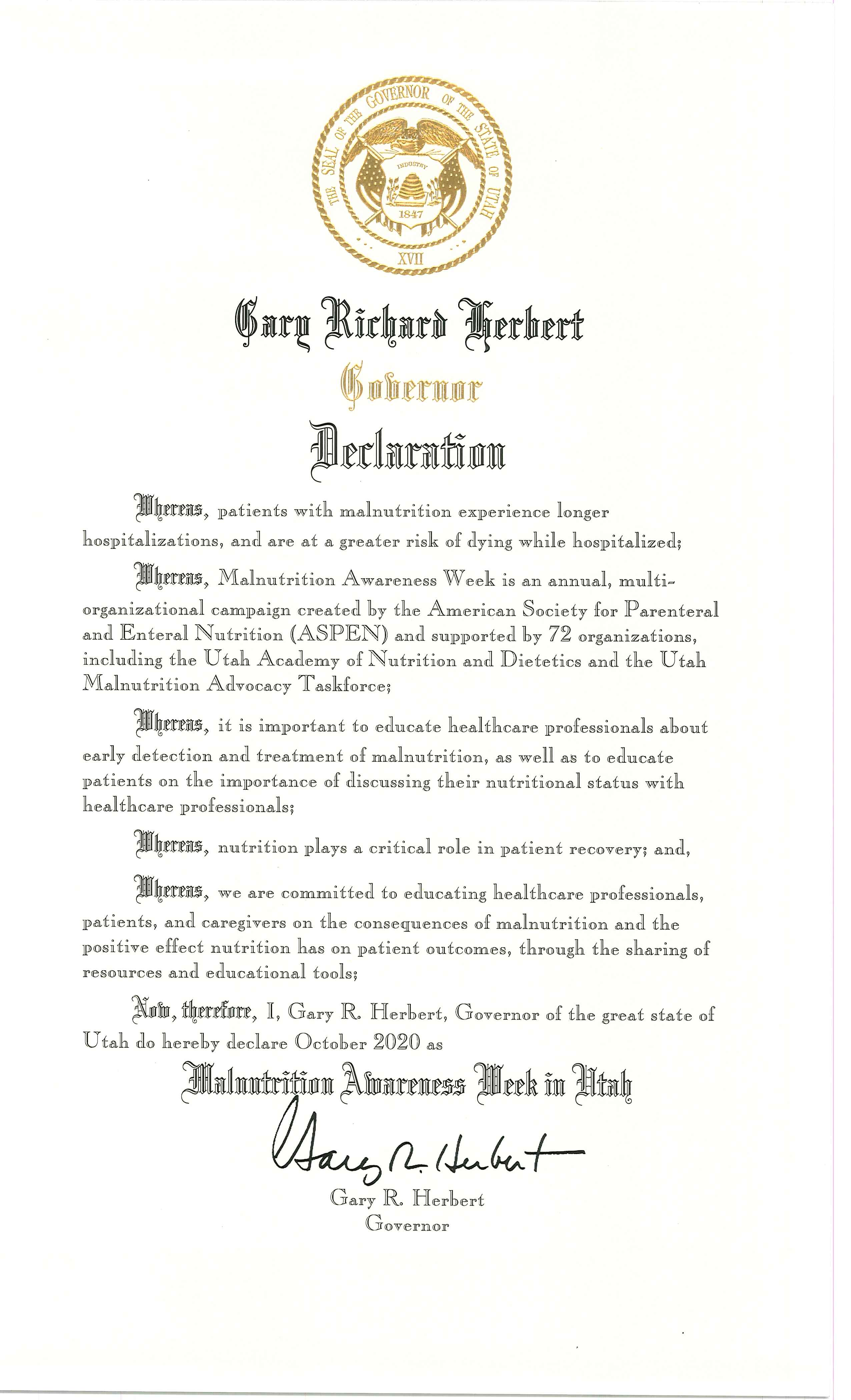Malnutrition Taskforce
Utah Malnutrition Advocacy Taskforce
Consistent with UAND’s vision to optimize Utah’s health through food and nutrition, the Utah Malnutrition Advocacy Taskforce (UMAT) is a group of multi-agency, interdisciplinary professionals focused on the prevention and treatment of malnutrition in Utah.
We welcome and encourage you to join us for bimonthly conference calls and advocacy work; contact WendyPhillips@IamMorrison.com.
Malnutrition Overview
Malnutrition is a condition where the body does not receive enough or the right balance of nutrients to function properly. Older adults, infants and children, and those who are critically ill or have a chronic disease are more likely to be malnourished. People with two or more of these signs may be malnourished:
- Unplanned weight loss
- Loss of appetite
- Not able to eat or only able to eat small amounts
- Feeling weak or tired
- Loss of strength or ability to do usual daily activities
Older Adult Malnutrition
Up to 1 out of 2 older adults is either at risk of becoming or is malnourished. Yet poor nutrition--often related to a lack of adequate protein to meet daily needs--is frequently not identified or treated, increasing the risk for negative health outcomes and loss of independence. The causes of malnutrition are multiple and complex and can include function and disease-associated risk factors. Increasingly, risk factors related to social/mental health and food insecurity are influencing malnutrition risk. The solutions require collaboration among many organizations, government bodies, and communities.
Check out these websites for great malnutrition care resources!
Academy of Nutrition and Dietetics’ Clinical Malnutrition
American Society of Parenteral and Enteral Nutrition’s Malnutrition Solution Center
Utah Falls Prevention Alliance’s Malnutrition Page
Defeat Malnutrition Today
Malnutrition Quality Improvement Initiative
Pediatric Malnutrition
Nutrition plays a crucial role in physical and neurological development in the early years of life. By identifying pediatric malnutrition early, you can prevent lifelong complications. Pediatric malnutrition is associated with increased hospitalizations; increased length of stay; increased infection rates; increased healthcare costs; decreased survival rates; poor growth; and developmental problems. Does pediatric malnutrition exist in the United States? Yes! While the actual prevalence is unknown, researchers found 30% of hospitalized pediatric patients were malnourished. The prevalence of obesity in children ages 2 to 19 years was 18.5% in 2015-2016.
Check out these website to help you identify pediatric malnutrition!
Pediatric Malnutrition
Pediatric Nutrition Screening Evidence Analysis Library
PediTools
Advocacy Opportunities to Support Malnutrition Care
Join us during Malnutrition Awareness Week to raise awareness about recognizing, preventing, and treating malnutrition! Learn more about this annual initiative at nutritioncare.org/maw. In 2019, Governor Herbert recognized this advocacy campaign in Utah, and he will again in 2020.

Medical Nutrition Therapy Act of 2020
This bill would expand the existing medical nutrition therapy (MNT) benefit for Medicare beneficiaries to cover additional disease and conditions, including but not limited to malnutrition and any condition related to unintentional weight loss. It also would expand the Secretary of Health and Human Services (HHS) to further expand the Medicare MNT benefit in the future without needing congressional action. HHS and Medicare could then respond to recommendations of the U.S. Preventive Services Task Force to expand coverage to diagnoses that are associated with evidence that MNT can improve health outcomes. Take Action and contact your congressional representatives to encourage them to sponsor or vote yes on this bill when they’re given the opportunity.
Medically Tailored Home Delivered Meals Act of 2020
In recognition of the -proven benefits of medically tailored meals (MTM) and the lack of coverage for this intervention, this new bill was introduced in the U.S. House of Representatives in May 2020. See Table for a description of key provisions of this bill.
| Covered Food Provider |
|
| Covered Hospitals |
|
| Eligible Individuals |
|
| Program Length |
|
| Outcome Measurement |
|
This will provide coverage for at least 20 hospitals located in at least 10 different states to carry out a demonstration program to provide MTM and MNT. The demonstration program period is a total of 3 years; if positive outcomes are demonstrated it can then be expanded as a mandate for all Medicare policies under the authority of Health and Human Services and the Centers for Medicare and Medicaid. This is exciting news! This can benefit Utahns in many ways, including:
- Providing sustainable funding to obtain data to prove the value of MTM programs to expand future Medicare funding.
- Private insurance companies are likely to do similar concurrent pilot demonstrations and/or match future Medicare funding decisions.
Malnutrition and COVID-19
People suffering from malnutrition are at higher risk for infectious diseases, including COVID-19. Likewise, infections like COVID impair immune function and increase nutrient needs and can lead to taste changes, fatigue, and other problems that affect nutrient intake, causing an increased risk to develop malnutrition.
All hospitalized patients, including those with COVID, should be screened for malnutrition and referred to a registered dietitian for a full nutrition assessment and care plan if malnutrition is suspected. Although more logistically challenging, people with a positive COVID-19 diagnosis should be screened for malnutrition and referred to a registered dietitian if the screening identifies malnutrition risk, even if not hospitalized. Early nutrition intervention may lead to better overall outcomes associated with the infection.
Patients who become critically ill from the COVID-19 virus may require enteral or parenteral nutrition support, and ASPEN published guidelines to guide doctors and dietitians and other healthcare providers on how best to provide this therapy.
Due to the weakened economy and job loss and an increase in social isolation and many other factors, food insecurity is an even bigger concern now. This problem can very quickly lead to malnutrition, especially in older adults. Many healthcare providers, such as hospitals and health systems, are working to implement programs that can help their community members obtain healthful foods in adequate amounts to support good overall health and prevent malnutrition.
